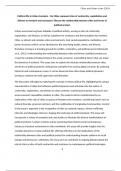Cities and Urban Lives 23/24
Political life in Urban Contexts – Do Cities represent sites of conformity, exploitation and
division or freedom and resistance? Discuss the relationship between cities and forms of
political protest.
Urban areas have long been hotbeds of political activity, serving as sites of conformity,
exploitation, and division, as well as a platform for resistance and the foundation for freedom.
Cities, as vibrant and complex urban environments, host varied populations, institutions, and
power structures which can be attributed to the area being sizable, dense, and diverse,
therefore serving as a breeding ground for conflict, contention, and political unrest (Uitermark
et al., 2012). Understanding the relationship between cities and forms of political protest can
reveal the complex interplay between the social, economic, and political factors that can shape
the dynamics of activism. This essay aims to explore the intricate relationship between cities
and forms of political protests, delving into examples from various global contexts. By analysing
historical and contemporary cases, it can be discerned how cities shape political dynamics,
serving as catalysts for both oppression and liberation.
The discussion will begin by exploring the concept of urban political life, highlighting the unique
characteristics of cities that influence political dynamics and will delve into the notion of
conformity, exploitation, and division in urban contexts, examining how power structures and
socio-economic inequalities manifest in cities. This analysis will be complimented by an
exploration of the role of cities as spaces of freedom and resistance, considering factors such as
cultural diversity, grassroot activism, and the mobilisation of marginalised communities. Central
to the essay’s argument is the recognition of cities as contested spaces, where conflicting
interests and ideologies intersect, shaping the landscape of political protest. This essay will
incorporate a variety of examples and case studies to illustrate the diverse manifestations of
political activism in urban contexts and by examining these historical and contemporary
instances of protest movements in cities worldwide, this essay will provide insights into the
complex dynamics of urban political life, offering reflections on the implications of the
relationship between cities and political protest for understanding broader patterns of social
change and democracy. Ultimately, the essay aims to contribute to ongoing debates about the
role of cities as sites of both conformity and resistance in contemporary political landscapes.
1




